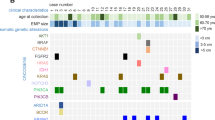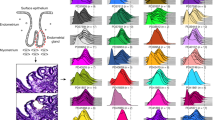Abstract
Expression of the E–cadherin cell adhesion molecule is reduced in several types of human carcinomas, and the protein serves as an invasion suppressor in vitro. To determine if mutations of the E–cadherin gene (on chromosome 16q22) contribute to epithelial tumorigenesis, 135 carcinomas of the endometrium and ovary were examined for alterations in the E–cadherin coding region. Four mutations were identified: one somatic nonsense and one somatic missense mutation, both with retention of the wild–type alleles, and two missense mutations with somatic loss of heterozygosity in the tumour tissue. These data support the classification of E–cadherin as a human tumour suppressor gene.
This is a preview of subscription content, access via your institution
Access options
Subscribe to this journal
Receive 12 print issues and online access
$209.00 per year
only $17.42 per issue
Buy this article
- Purchase on Springer Link
- Instant access to full article PDF
Prices may be subject to local taxes which are calculated during checkout
Similar content being viewed by others
References
Fearon, E.R. et al. Identification of a chromosome 18q gene that is altered in colorectal cancers. Science 247, 49–56 (1990).
Höhne, M.W., Halatsch, M.-E., Kahl, G.F. & Weinel, R.J. Frequent loss of expression of the potential tumor suppressor gene DCC in ductal pancreatic adenocarcinoma. Cancer Res. 52, 2616–2619 (1992).
Gao, X., Honn, K.V., Grignon, D., Sakr, W. & Chen, Y.Q. Frequent loss of expression and loss of heterozygosity of the putative tumor suppressor gene DCC in prostatic carcinoma. Cancer Res. 53, 2723–2727 (1993).
Edelman, G.M. Morphoregulatory molecules. Biochemistry 27, 3533–3543 (1988).
Takeichi, M. Cadherins: a molecular family important in selective cell-cell adhesion. Annu. Rev. Biochem. 59, 237–252 (1990).
Mahoney, P.A. et al. The fat tumor suppressor gene in Drosophila encodes a novel member of the cadherin gene superfamily. Cell 67, 853–868 (1991).
Shimoyama, Y. et al. Cadherin cell-adhesion molecules in human epithelial tissues and carcinomas. Cancer Res. 49, 2128–2133 (1989).
Nagafuchi, A., Shirayoshi, Y., Okazaki, K., Yasuda, K. & Takeichi, M. Transformation of cell adhesion properties by exogenously introduced E-cadherin cDNA. Nature 329, 341–343 (1987).
Behrens, J., Mareel, M.M., Van Roy, F.M. & Birchmeier, W. Dissecting tumor cell invasion: epithelial cells acquire invasive properties after the loss of uvomorulin-mediated cell-cell adhesion. J. Cell Biol. 108, 2435–2447 (1989).
Frixen, U.H. et al. E-cadherin-mediated cell-cell adhesion prevents invasiveness of human carcinoma cells. J. Cell Biol. 113, 173–185 (1991).
Vleminckx, K., Vakaet, L., Mareel, M., Fiers, W. & Van Roy, F. Genetic manipulation of E-cadherin expression by epithelial tumor cells reveals an invasion suppressor role. Cell 66, 107–119 (1991).
Shimoyama, Y. & Hirohashi, S. Expression of E- and P-cadherin in gastric carcinomas. Cancer Res. 51, 2185–2192 (1991).
Bussemakers, M.J.G. et al. Decreased expression of E-cadherin in the progression of rat prostatic cancer. Cancer Res. 52, 2916–2922 (1992).
Umbas, R. et al. Expression of the cellular adhesion molecule E-cadherin Is reduced or absent in high-grade prostate cancer. Cancer Res. 52, 5104–5109 (1992).
Brabant, G. et al. E-Cadherin: A differentiation marker in thyroid malignancies. Cancer Res. 53, 4987–4993 (1993).
Bringuier, P.P. et al. Decreased E-cadherin immunoreactivity correlates with poor survival in patients with bladder tumors. Cancer Res. 53, 3241–3245 (1993).
Inoue, M., Ogawa, H., Miyata, M., Shiozaki, H. & Tanizawa, O. Expression of E-cadherin in normal, benign, and malignant tissues of female genital organs. Am. J. clin. Pathol. 98, 76–80 (1992).
Mansouri, A., Spurr, N., Goodfellow, P.N. & Kemler, R. Characterization and chromosomal localization of the gene encoding the human cell adhesion molecule uvomorulin. Differentiation 38, 67–71 (1988).
Natt, E., Magenis, R.E., Zimmer, J., Mansouri, A. & Scherer, G. Regional assignment of the human loci for uvomorulin (UVO) and chymotrypsinogen B (CTRB) with the help of two overlapping deletions on the long arm of chromosome 16. Cytogonet. Cell Genet. 50, 145–148 (1989).
Carter, B.S. et al. Allelic loss of chromosomes 16q and 10q in human prostate cancer. Proc. natn. Acad. Sci. U.S.A. 87, 8751–8755 (1990).
Bergerheim, U.S.R., Kunimi, K., Collins, V.P. & Ekman, P. Deletion mapping of chromosomes 8,10, and 16 in human prostatic carcinoma. Genes Chrom. Cancer 3, 215–220 (1991).
Kunimi, K., Bergerheim, U.S.R., Larsson, I.-L., Ekman, P. & Collins, V.P. Allelotyping of human prostatic adenocarcinoma. Genomics 11, 530–536 (1991).
Sato, T., Saito, H., Morita, R., Koi, S., Lee, J.-H. & Nakamura, Y. Allelotype of human ovarian cancer. Cancer Res. 51, 5118–5122 (1991).
Devilee, P. et al. Allelotype of human breast carcinoma: a second major site for loss of heterozygosity is on chromosome 6q. Oncogene 6, 1705–1711 (1991).
Tsuda, H. et al. Allele loss on chromosome 16 associated with progression of human hepatocellular carcinoma. Proc. natn. Acad. Sci. U.S.A. 87, 6791–6794 (1990).
Bussemakers, M.J.G., Mees, S.G.M., Van Bokhoven, A., Debruyne, F.M.J. & Schalken, J.A. Molecular cloning and characterization of the human E-cadherin cDNA. Molec. Biol. Rep. 17, 123–128 (1993).
Oda, T. et al. E-cadherin gene mutations in human gastric carcinoma cell lines. Proc. natn. Acad. Sci. U.S.A. 91, 1858–1862 (1994).
Hoffman, S. & Edelman, G.M. Kinetics of homophilic binding by E and A forms of the neural cell adhesion molecule. Proc. natn. Acad. Sci. U.S.A. 80, 5762–5766 (1983).
Doherty, P. et al. A threshold effect of the major isoforms of NCAM on neurite outgrowth. Nature 343, 464–466 (1990).
Sasaki et al. Mutation of the Ki-ras protooncogene in human endometrial hyperplasia and carcinoma. Cancer Res. 53, 1906–1910 (1993).
Chomczynski, P. & Sacchi, N. Single-step method of RNA isolation by acid guanidinium thiocyanate-phenot-chloroform extraction. Anal. Biochem. 162, 156–159 (1983).
Author information
Authors and Affiliations
Rights and permissions
About this article
Cite this article
Risinger, J., Berchuck, A., Kohler, M. et al. Mutations of the E–cadherin gene in human gynecologic cancers. Nat Genet 7, 98–102 (1994). https://doi.org/10.1038/ng0594-98
Received:
Accepted:
Issue Date:
DOI: https://doi.org/10.1038/ng0594-98
This article is cited by
-
Differential expression of Oct-4, CD44, and E-cadherin in eutopic and ectopic endometrium in ovarian endometriomas and their correlations with clinicopathological variables
Reproductive Biology and Endocrinology (2020)
-
A high-throughput screen to identify novel synthetic lethal compounds for the treatment of E-cadherin-deficient cells
Scientific Reports (2019)
-
Frequency of CDH1 germline variants and contribution of dietary habits in early age onset gastric cancer patients in Brazil
Gastric Cancer (2019)
-
Mutual exclusion of CDH1 and BRCA germline mutations in the pathway of hereditary breast cancer
Archives of Gynecology and Obstetrics (2018)
-
Reply to letter by Dr. G. Corso
Archives of Gynecology and Obstetrics (2018)



